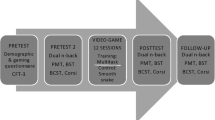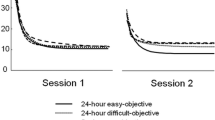Abstract
Witt, Linkenauger, and Proffitt (Psychological Science, 23, 397–399, 2012) demonstrated that golf putting performance was enhanced when the hole was surrounded by small circles, making it look larger, relative to when it was surrounded by large circles, making it look smaller. In the present study, we examined whether practicing putting with small or large surrounding circles would have not only immediate effects on performance, but also longer-lasting effects on motor learning. Two groups of nongolfers practiced putting golf balls to a 10.4-cm circle (“hole”) from a distance of 2 m. Small or large circles were projected around the hole during the practice phase. Perception of hole size was affected by the size of the surrounding circles. Also, self-efficacy was higher in the group with the perceived larger hole. One day after practice, participants performed the putting task, but without visual illusions (i.e., a retention test). Putting accuracy in retention was greater for the group that had practiced with the perceived larger hole. These findings suggest that the apparently larger target led to the more effective learning outcome.




Similar content being viewed by others
Notes
Due to technical issues, the circle drawings of two participants in the group with the perceived smaller circle were lost.
References
Ávila, L. T. G., Chiviacowsky, S., Wulf, G., & Lewthwaite, R. (2012). Positive social-comparative feedback enhances motor learning in children. Psychology of Sport and Exercise, 13, 849–853.
Badami, R., VaezMousavi, M., Wulf, G., & Namazizadeh, M. (2011). Feedback after good versus poor trials affects intrinsic motivation. Research Quarterly for Exercise and Sport, 82, 360–364.
Badami, R., VaezMousavi, M., Wulf, G., & Namazizadeh, M. (2012). Feedback about more accurate versus less accurate trials: Differential effects on self-confidence and activation. Research Quarterly for Exercise and Sport, 83, 196–203.
Chauvel, G., Maquestiaux, F., Hartley, A. A., Joubert, S., Didierjean, A., & Masters, R. (2012). Age effects shrink when motor learning is predominantly supported by nondeclarative, automatic memory processes: Evidence from golf putting. Quarterly Journal of Experimental Psychology, 65, 25–38.
Chiviacowsky, S., & Wulf, G. (2007). Feedback after good trials enhances learning. Research Quarterly for Exercise and Sport, 78, 40–47.
Clark, S. E., & Ste-Marie, D. M. (2007). The impact of self-as-a-model interventions on children’s self-regulation of learning and swimming performance. Journal of Sports Sciences, 25, 577–586.
Damisch, L., Stoberock, B., & Mussweiler, T. (2010). Keep your fingers crossed! How superstition improves performance. Psychological Science, 21, 1014–1020. doi:10.1177/0956797610372631
Feltz, D. L., Chow, D. M., & Hepler, T. J. (2008). Path analysis of self-efficacy and diving performance revisited. Journal of Sport and Exercise Psychology, 30, 401–411.
Lee, C., Linkenauger, S. A., Bakdash, J. Z., Joy-Gaba, J. A., & Proffitt, D. R. (2011). Putting like a pro: The role of positive contagion in golf performance and perception. PLoS ONE, 6, e26016. doi:10.1371/journal.pone.0026016
Lewthwaite, R., & Wulf, G. (2010). Social-comparative feedback affects motor skill learning. Quarterly Journal of Experimental Psychology, 63, 738–749.
Masters, R. S. W., Poolton, J. M., & Maxwell, J. P. (2008). Stable implicit motor processes despite aerobic locomotor fatigue. Consciousness and Cognition, 17, 335–338. doi:10.1016/j.concog.2007.03.009
Moritz, S. E., Feltz, D. L., Fahrbach, K., & Mack, D. (2000). The relation of self-efficacy measures to sport performance: A meta-analytic review. Research Quarterly for Exercise and Sport, 71, 280–294.
Saemi, E., Porter, J. M., Ghotbi-Varzaneh, A., Zarghami, M., & Maleki, F. (2012). Knowledge of results after relatively good trials enhances self-efficacy and motor learning. Psychology of Sport and Exercise, 13, 378–382.
Saemi, E., Wulf, G., Ghotbi-Varzaneh, A., & Zarghami, M. (2011). Feedback after good versus poor trials enhances motor learning in children. Brazilian Journal of Physical Education and Sport, 25, 671–679.
Schmidt, R. A., & Lee, T. D. (2011). Motor control and learning (5th ed.). Champaign, IL: Human Kinetics.
Stevens, D., Anderson, D. I., O’Dwyer, N. J., & Williams, A. M. (2012). Does self-efficacy mediate transfer effects in the learning of easy and difficult motor skills? Consciousness and Cognition, 21, 1122–1128. doi:10.1016/j.concog.2012.03.014
Trempe, M., Sabourin, M., & Proteau, L. (2012). Success modulates consolidation of a visuomotor adaptation task. Journal of Experimental Psychology: Learning, Memory, and Cognition, 38, 52–60.
Witt, J. K., Linkenauger, S. A., & Proffitt, D. R. (2012). Get me out of this slump! Visual illusions improve sports performance. Psychological Science, 23, 397–399. doi:10.1177/0956797611428810
Wood, G., Vine, S. J., & Wilson, M. R. (2013). The impact of visual illusions on perception, action planning, and motor performance. Attention, Perception, & Psychophysics, 75, 830–834. doi:10.3758/s13414-013-0489-y
Wulf, G., Chiviacowsky, S., & Lewthwaite, R. (2010). Normative feedback effects on learning a timing task. Research Quarterly for Exercise and Sport, 81, 425–431.
Wulf, G., Chiviacowsky, S., & Lewthwaite, R. (2012). Altering mindset can enhance motor learning in older adults. Psychology and Aging, 27, 14–21.
Author information
Authors and Affiliations
Corresponding author
Rights and permissions
About this article
Cite this article
Chauvel, G., Wulf, G. & Maquestiaux, F. Visual illusions can facilitate sport skill learning. Psychon Bull Rev 22, 717–721 (2015). https://doi.org/10.3758/s13423-014-0744-9
Published:
Issue Date:
DOI: https://doi.org/10.3758/s13423-014-0744-9




